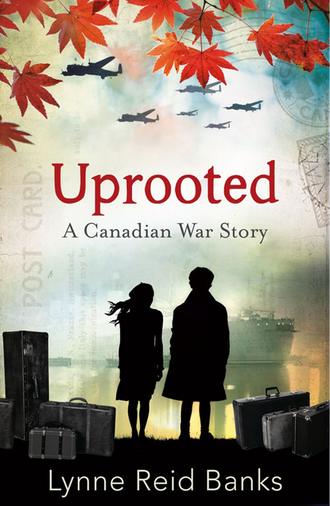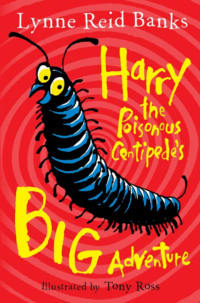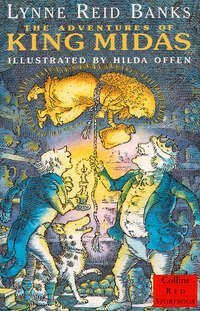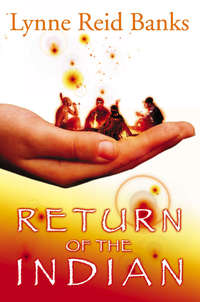
Полная версия
Uprooted - A Canadian War Story
At first we just wandered about in the little park near the house. Spajer tagged along, hoping for a walk or a game of ball, when Luti agreed to let him out – she was terrified he’d get lost or be run over, but he stuck close to Cameron, and Cameron took good care of him.
“Bubbles is half-spaniel,” he reminded me. “We only call him a Bulgarian bulldog to make him sound like a thoroughbred.”
There were lots of other kids, and other dogs, around the neighbourhood. They stared at us too – we didn’t dress like them; Cameron in his short grey flannel trousers and me in my English dresses. But they were a friendly lot and we soon started hanging out with them.
It was girls with girls and boys with boys, mixed school or not. So while I was learning ball games like ‘One, two, three allairy’ and skipping games and sometimes being invited to play in my new friends’ ‘back yards’ (as they called their gardens), some of the boys were showing Cameron what they called ‘the ropes’.
The railway ran past the back of our house. Of course, we’d heard the trains go by, but there was a big screen of fir trees that stopped us seeing much of them.
Cameron came home one day and told me casually that the best game was throwing things at the engine drivers.
“What!” I almost screamed. “Are you mad? What do you mean?”
“Wait till it’s time for the next train, I’ll show you. The railway’s great fun. Only we’ll leave Spaje behind, because he’s not very train-wise.”
In the late afternoon, he found me in the park and beckoned. I left the other girls and followed him round by the end of the street to the railway crossing. We crossed over then followed the tracks a little way back towards the house.
He took out a one-cent coin and laid it on the track.
“What’s that for?”
“You’ll see. Now, collect tin cans.”
I looked around but only found two. He did too.
“That’s enough. It’s all you’ll have time for,” he said. “There’s a train due soon. Put your ear to the rail and you can feel it coming.”
“I’m not putting my head on the line! That’s dangerous!”
“Oh, don’t be babyish! You can see it coming for miles. It’s just fun to feel the rail vibrate.”
Very reluctantly I knelt down on one of the wooden sleeper beams and put my ear to the cold rail, next to the cent, lying there waiting for its fate.
“Don’t knock the cent off!” Cameron shouted.
After a bit I felt a trembling, and at the same time I heard a sort of humming sound. I leapt to my feet and ran away from the line. Cameron was there with a tin can in each hand. Far away down the line I could see the smoke puffing out above the trees.
“What do we do?”
“When the train goes by, you throw them at the engine driver in his cab,” he said.
We’d been up to mischief before in our lives. But this? “What if you hit him? You could hurt him!”
“Oh, you never hit them, they’re going too fast. It’s good throwing if you get it anywhere near the cab.”
Now we could hear the train coming. Its whistle was blowing and next moment it came into sight, round the bend. The great locomotive, spilling out smoke, came chuffing and grunting and whistling towards us. Just as the open part, where the driver and the fireman were standing, flashed past my eyes, Cameron shouted “Now!” and threw his tin cans swiftly one after the other like cricket balls.
They hit the fire-box and bounced off harmlessly, but one of the men shook his fist out of the cab at us, and then turned back, and made the whistle shriek, as if broadcasting our badness. Even though I never got around to even picking my tin cans up, let alone throwing them, I felt the shame of it.
We stood there. Cameron was panting and grinning. He looked as excited as if he’d been throwing tin cans at Hitler. When the whole long, long train – a goods train – had gone past, he rushed to the line, bent down, and picked up the coin.
“Look!”
He showed it to me. It was thin and flat and its dull copper colour had changed to silvery brightness. I touched it with one finger. It was warm.
“Here, you have it. Don’t go telling Auntie,” Cameron said.
I took the only bribe of my life – a train-flattened one-cent coin.
“I won’t if you promise not to do that again,” I said.
“Goody-goody,” he muttered, not for the first time.
On the way home, he recited, in a thoughtful, matter-of-fact voice:
“The boy stood on the railway line,
The train was coming fast.
The boy stepped off the railway line,
The train went whizzing past.
The boy stood on the railway line,
The engine gave a squeal.
The driver took an oily rag
And wiped him off the wheel.”
At the weekend Gordon ‘did things’ with us. He called himself our Poppa, as in “Poppa’s gonna take his kids out tomorrow and show them the sights!” Mummy was expected to come too. Luti mostly stayed home, or sometimes went out to play bridge. Her bridge club was very important to her. She tried to take Mummy but she said she was such a bad player she’d only spoil the game.
We didn’t always go on these trips by car because Gordon wanted us to learn how to ride the streetcars. These ran on rails down the middle of main streets, with a sort of arm on the roof that reached up to electrified wires overhead. They rocked and swayed and made a loud clanging noise. There were two sorts: the big ones that took us across the bridge into downtown, where the hotels, movie theatres and restaurants were; and the local ones that were smaller and were known as puddle-jumpers.
Apart from the movie theatres, downtown didn’t mean much to us, except for one hotel, the Bessborough. It was rather grand, with pointed turrets, and it stood in a large park on the west bank. There, Gordon liked to take ‘his family’ for Sunday lunch in the smart restaurant that overlooked the river. O’F sometimes came too. We loved seeing him but we didn’t very often, because Mummy said he preferred seeing us on our own.
Gordon seemed to know a lot of people, and the meal would always be interrupted by him jumping to his feet, waving and beckoning to these acquaintances, who would come over and be introduced to us. I could see how much this embarrassed Mummy. Luti had asked her to dress up for these outings and the men always looked admiringly at her.
“Gordie loves showing you off,” Luti had said. “He thinks you’re beautiful. He loves your hair. Could you leave your turban off, do you think?”
After lunch, Cameron and I would play in the park for a bit while the grown-ups sat on a bench talking. The river fascinated us, not just because it was so wide and sort of wild-looking but because these lunchtimes were the only chance we had to play near it. Mummy had forbidden us to go to the riverbank by ourselves. The bank on our east side was untamed – steep and thick with undergrowth. She was always afraid we’d fall in and be swept away by the strong current. Cameron muttered his favourite Swallows and Amazons quote – “Better drowned than duffers” – a lot but it didn’t make any difference.
It was especially hard for him because all the other boys went down there.
“That’s where they go sledding and tobogganing in the winter,” he said. “I hope Auntie’s got over her terrors by then. There aren’t any other hills to sled down.”
But he did go out on to the prairie with the others (riding on the crossbar of a friend’s bike) to catch gophers. He caught three, with the string-loop, and cut their tails off (when they were dead) to send in for the bounty. It was ten cents per tail. He used the thirty cents to buy Mummy some sweets.
“Candies,” I said.
“Sweets,” he said.
I was picking up lots of Canadian words that he refused to use.


On our first day at school, Gordon took the morning off. He wanted to be the one to take us.
The school was quite far away. The puddle-jumper would have taken us most of the way but Gordon said we shouldn’t use it. “All the kids here walk to school. I bet that’s something new for you, isn’t it?”
Cameron said nothing. I’d noticed he often kept a dignified silence when Gordon said something that hinted at Canada being somehow better than England. But I said, “At my first school, I always walked, even when I was only seven. By myself.” I wasn’t going to let Gordon think we were sissies or something.
When I first saw Buena Vista Public School, I stopped dead in the gateway and couldn’t make my legs move for a minute. Gordon tugged my hand.
“Aw, c’mon, Lindy! It’s only a big ol’ school! Bet you never went to such an impressive one, though!”
True enough. My earliest school had been in an ordinary house. My boarding school had been a low building surrounded by fields and woods. This looked like a castle out of Grimm’s Fairy Tales.
Cameron was striding ahead. He wasn’t going to let Gordon tug him along. I freed my hand and made myself walk across the front yard and up the wide stone steps; there were, after all, dozens of children and some grown-ups all around me.
Gordon took us to the head teacher’s office. On the door was printed the word ‘PRINCIPAL’. I remembered my first day at my convent boarding school and half expected there to be a nun inside, but it was just an ordinary woman. She stood up from her desk and came to shake hands with us.
“I’m Mrs Jameson,” she said. “I’m very glad you’ve come to our school. We’re very excited to welcome you.”
Excited? Cameron flicked me a look. He didn’t like ‘excited’, but I did. As much as he hated to be the centre of attention, I loved it.
“Cameron will be in 7A,” she said, “and Lindy in 6B. Your classmates are expecting you. Come with me now – I’ll introduce you.”
Gordon tagged along, but at the door to the first classroom, the principal turned to him politely and said, “Mr Laine, I think it would be better if you left the introductions to me.”
Gordon looked disappointed. But he said he’d pick us up after school.
I don’t remember what happened with Cameron. But I remember very well being led into my class, 6B. There were about twenty-five children of my age, all sitting in double desks facing a huge blackboard. There were big windows along one wall, and the others were a mass of colour, which turned out to be maps and charts and pictures. When Mrs Jameson and I came in, everybody stood up and every face turned to us.
“Class, this is Lindy Hanks. She’s our war guest from London, England. Will you please give her a real Buena Vista welcome?”
To my amazement, everybody not only clapped, but cheered. I remembered the restaurant and ‘There’ll Always Be an England’. Well, at least they wouldn’t start singing that!
The teacher, who was young and pretty with shiny black hair and lipstick, came over to me, and the principal left.
“Hello, Lindy. I’m Miss Bubniuk. Now, where shall we put you? Who’d like to have Lindy share their desk?”
Three girls sitting alone threw their hands up. Miss Bubniuk led me to one of them.
“This is Marylou, she’ll be your desk partner.”
Marylou was one of the girls I already knew from the little park.
“Oh, good, Lindy!” she said, so excitedly I thought she was going to hug me. She patted the seat beside her and actually did put her arm around me when I sat down. All the others kept their faces turned towards me until Miss Bubniuk clapped her hands for attention.
The time till lunch passed in a whirl of enthusiasm. You’d have thought I was a princess come among them, the way they treated me. At break, which they called ‘recess’, Marylou and the other girls from the park showed me off as if I were their proudest possession. My celebrity went to my head a bit so that by lunchtime I felt like a princess. I swaggered over to Cameron, who was sitting alone in a corner of the playground.
“These kids are really swell!” I enthused.
“Don’t say ‘kids’,” he said. “And don’t say ‘swell’. It’s beastly slang.”
Cameron could be very scathing sometimes. But this time he couldn’t squash me. I loved the new words.
Luti had packed sandwiches for us. We opened them up together. Peanut butter and jelly – a whole new taste experience, right up there with waffles and maple syrup, corn on the cob streaming with butter, and pork spare ribs cooked with brown sugar, one of Luti’s specialities. I loved the food in Canada. Cameron didn’t, or pretended not to. He said none of it was a patch on roast beef and fish and chips.
“This is ridiculous,” he muttered as we sat on a wall, eating our sandwiches.
“What is?”
“The lessons. They’re so incredibly easy. We did the maths they’re doing ages ago. They don’t know the first thing about British history. We were up to the Industrial Revolution at home. They’ve never heard of it here. It’s all about Canada. And the book we’re reading in class is for babies.”
I hadn’t found the lessons particularly easy, just strange. Miss Bubniuk was much less strict than the nuns and there was far more shouting out the answers and whispering. I saw two boys throwing rubbers at each other when she was writing on the board. I thought it was more fun than the convent, but so different I hadn’t thought to compare what we were actually learning. It was new, that was the long and short of it. Everything was, and that stopped me comparing it with England.
I said, “I guess we just have to get used to it.”
Cameron glared at me. “You suppose. You don’t ‘guess’.”
“That’s how they talk here.”
“Well, it’s not how I talk. If you start putting on a Canadian accent I won’t talk to you at all.”
I wasn’t having that. “Can’t I even say ‘recess’ instead of ‘break’?” I teased.
Just then some of the girls from my class called me to come and play a ball-bouncing game. I stuffed the last bit of sandwich into my mouth and left Cameron sitting there alone. I didn’t even stop to wonder why the ‘kids’ in 7A hadn’t made a prince out of him.
I soon found out, though. Cameron’s teacher having come to the same realisation as my cousin – that he was a good year ahead of his classmates – suggested he move straight to the local high school. So before I’d even got completely used to the way to school, letting him lead the way, I had to manage on my own. Cameron was now a student at Nutana Collegiate. There he joined a class called 9A. The high school was, I learnt, streamed – A students (the best) in A, Bs in B and so on. Cameron was the A-est student you could imagine, although he was nearly two years younger than the others in his year group.
I was secretly hoping that this age difference would mean that he’d fall back a bit on me, as the others in his class would be too old for him. But that wasn’t what happened. Cameron didn’t care whether people liked him or not, so of course they all wanted him to like them and he became something of a prince to them, which lasted long after I’d stopped being a princess and gone back to being just a girl who ‘talked funny’, like calling her mother Mummy instead of Mom.
After I stopped being special, I wasn’t invited to play after school much and I didn’t seem to have any real friends. I complained to Mummy that there must be something wrong with me.
“You’re different, that’s all. They’ll get used to you.”
“Should I start talking like them? Would you mind if I called you Mom?”
“I would absolutely hate it. I’d rather you called me Alex. But anyway there’s no point in putting something on that isn’t you. Be yourself and see what happens.”
Nothing did for a couple of weeks. Then Willie happened.
One thing that we all did together – apart from playing with Spajer and taking him for walks – was go to the movies.
This involved a streetcar ride into Downtown, where the movie theatres were. We were all sitting in the stalls at the Capitol, the grandest, one Saturday afternoon, and I noticed another girl with plaits like mine, only red, sitting next to me with her mother. She didn’t go to Buena Vista or I’d have seen her. She was wearing trousers and a khaki top like a battledress.
The double bill – two films – was always accompanied by a cartoon, trailers and a newsreel, and on this afternoon started with the newsreel. The famous Pathé theme music was blaring but I was eyeing this girl next to me and not paying a lot of attention, when suddenly I heard Mummy give a little gasp, and Cameron, who was on the other side of me, leant forward and gripped the seat in front.
Конец ознакомительного фрагмента.
Текст предоставлен ООО «ЛитРес».
Прочитайте эту книгу целиком, купив полную легальную версию на ЛитРес.
Безопасно оплатить книгу можно банковской картой Visa, MasterCard, Maestro, со счета мобильного телефона, с платежного терминала, в салоне МТС или Связной, через PayPal, WebMoney, Яндекс.Деньги, QIWI Кошелек, бонусными картами или другим удобным Вам способом.







